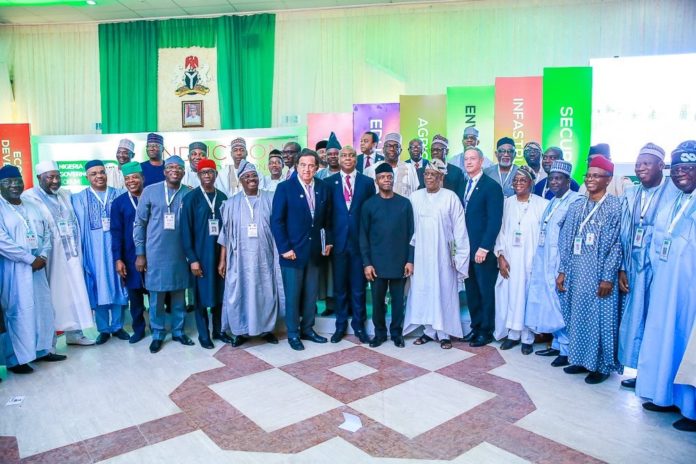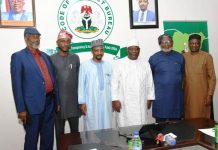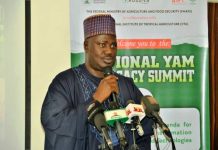“Your Excellencies, these principles remain the President’s firm commitments to the States. In the next four years, Mr. President has made it clear that we will be focusing our attention on human capital development and physical infrastructure. We will be working with the States on education, especially the education of girls, and we have begun some deep diving in this respect with our HDI work at the National Economic Council.” – Osinbajo
REMARKS BY HIS EXCELLENCY, PROF. YEMI OSINBAJO, SAN, GCON, AT THE INDUCTION OF NEW AND RETURNING GOVERNORS AT THE BANQUET HALL, STATE HOUSE ABUJA, ON THE 29TH OF APRIL, 2019.
PROTOCOLS
It is a great honour to be here at this induction of the freshly elected Governors of States. First, please accept my heartfelt congratulations on your election victories. I reiterate that my congratulations are heartfelt, even to the PDP governors who are present here and all the governors from other parties.
We elected executive officials belong to an elite club in this nation. Of over 200 million people, the nation elects one President and one Vice President, 36 Governors and 36 deputies, altogether 74 Nigerians, in all 74 men and women out of 200 million people.
We are so specially privileged and so enormously fortunate that our people choose us among so many other millions to lead them.
This tremendous privilege which leadership thrusts upon us also comes with grave responsibilities. Those responsibilities are multiplied by the fact that most of our people are extremely poor. Large numbers are unable to afford good healthcare and malnutrition remains a major problem. Children in many of our States run the risk of being permanently mentally stunted because they are malnourished. Illiteracy is still significantly high and the number of out of school children is an embarrassment.
Yet in all these, our population continues to grow at over 3% per annum. We will by current projections, move from 200 million to 400 million people in the next three decades. And then we will become the third most populous nation in the world.
Most of that population will be young people under the age of 25 looking for jobs. Every one of these people, except a few living in Abuja will live in the States, your States, where you govern. They will seek schools in your States, health services in your States, food in your States and jobs in your States.
The Federal Government will, as is usual, possibly be blamed for the number of out-of-school children and for not investing enough in healthcare. But you and I know that the primary responsibility for education and healthcare lies with the States.
The burdens of the citizens of our States, the pains and deprivations of their poverty is what they hope would be alleviated by electing us. No matter how we slice it, we are responsible for the quality of lives and livelihoods of the millions who live within our States and National borders.
In any event, all of the problems that our people have will be solved by men and women and not spirits. We are those men and women. History and providence have put us in these positions at this time. And we have the mental and physical wherewithal to solve the problems. But we may or may not solve the problem, which is a choice.
We may revel in the same old excuses, and leave the poverty statistics worse or where we met them. All elected officials in Nigeria since I started following national developments have always complained about inadequate funds. So we will not be saying anything new if and when we raise those same complaints.
Lagos State, the highest internally generated revenue earner was earning N600million in IGR in the year 2000 when minimum wage was increased from N7500 to N18000, about 140% increase. We are confronted again with the new increase in minimum wage, and the same problems that increase in minimum wage mean, so as scripture says, “There is nothing new under the Sun.”
We must confront the problem, not merely by hoping that the Federal Government can do more, because that may not necessarily offer much hope. Already, our deficit is close to N2trillion, while debt service to revenue is somewhere in the order of 54%.
States must in the next few years, earn more in IGR. We must more effectively collect VAT and increase our agricultural output, work with the Federal Government to make broadband infrastructure available all over the country, so our young people anywhere in the country can do jobs from anywhere in the world, from their villages in any corner of Nigeria.
If a State is charging for right-of-way from communications companies and is hindering the laying of cables and other broadband infrastructure as an IGR measure, permit me to say that that will be penny wise and pound foolish. To tap into the millions of jobs in technology and other services that a country like India, for example, has tapped into, requires broadband infrastructure across the country.
There is no other way of doing that except by dropping the idea that we can benefit from just the laying of cables and providing infrastructure. We must as a whole, allow a situation where broadband infrastructure is available everywhere. All the governors at the National Economic Council have all agreed on a pathway to make this happen.
How about Agriculture? Each State must leverage its most advantageous agricultural produce, and working with the Federal government’s initiatives in agricultural credit and the recently launched Green Imperative, with the Brazilian Government, it is possible for States to generate significant revenues from agriculture. After all, a lot of the relatively mind-boggling achievements of the regions in our history were without oil money, but mainly revenues from agriculture and taxes. Today, we have even more options.
On the part of the Federal Government, we have our work well cut out for us. But it may offer some comfort to reiterate that President Muhammadu Buhari has shown in the past four years that he would be completely transparent with the Federation Account and with all other Federation funds.
Second, that all States will be treated fairly and equitably, irrespective of party affiliations, and thirdly that the Federal Government will play its role in support of States as often as necessary and within its means.
We have in the past three years, intervened through loans, bailouts and Paris Club refunds to the tune of well over N1.1trillion. This represents the highest amount of Federal Government’s extra-statutory allocations and interventions to States in Nigeria’s history and we are proud to say that there were no discriminations along party lines.
Your Excellencies, these principles remain the President’s firm commitments to the States. In the next four years, Mr. President has made it clear that we will be focusing our attention on human capital development and physical infrastructure. We will be working with the States on education, especially the education of girls, and we have begun some deep diving in this respect with our HDI work at the National Economic Council.
We are doing the same with healthcare. We have already started to implement the 1% of CRF in the Health Act and that was implemented in the 2018 budget and we intend to do so with the 2019 budget.
We are also now implementing the Basic Health Care Provision Fund, but we know that budget funds alone cannot deal with the healthcare requirements of 200million people; so compulsory health insurance by law is the objective. This is to be implemented by using co-payments in order to ensure that we share the cost between individuals, the private sector and government, while the poorest 40% will be exempted from such co-payments.
By this means, we hope to get to at least a 65% increase in the share of the population covered by primary health care by 2023, up from the present about 12.6%. Keeping a similar level of ambition, we expect that by the year 2028, we should have complete coverage of the National Health Insurance.
In addition, our Social Investment Programmes have been effective in almost all States of the Federation. All States of the Federation have cooperated with the Federal Government in implementing these schemes.
Every State has its own share of our 500,000 N-Power beneficiaries; petty traders in every State have received of the N2million TraderMoni or MarketMoni loans given so far. 30 States make up the 9.5million children fed daily under our Homegrown School Feeding Programme and about 18 States so far, have benefitted from the cash transfers to the poorest and most vulnerable. We intend to continuously expand these important pro-poor, wealth creation programmes.
Another landmark intervention, which has also had the cooperation of all the States, is the Presidential Enabling Business Environment Council (PEBEC), set up by Mr. President on July 2016 to address and resolve bureaucratic bottlenecks standing in the way of business and investment in Nigeria, and to generally deliver a vastly improved business environment.
We brought together stakeholders from across the government – Federal, State Governments, the Executive, the Judiciary and the Private Sector. Since 2016, PEBEC has rolled out a number of high-impact reforms that have resulted in Nigeria moving up 24 points from the 169th position to the 145th position in the 2017 Ease of Doing Business Ranking, and we have retained the same position in 2018 but we intend to move further very quickly, the most impressive improvement we have ever recorded. We were also named amongst the 10 best reforming economies in the world.
We have recorded improvements in business registration processes, filing of taxes, imports and exports of good, visa applications, ports operations, and so on, by focusing on streamlining existing processes and introducing automation. In all of these, we have had the active collaboration of all the States of the Federation. In some cases, some States have gone even beyond what we agreed to sharpen and speed up their own processes, which have contributed to the ease of doing business.
We have also taken the initiative to develop an Omnibus Bill to capture the various Executive Orders signed by the President to ensure the institutionalization of our Ease of Doing Business Reform. The goal is to ensure that Nigeria becomes a progressively easier place to do business.
On infrastructure, we were determined, as soon as we came into office, to ensure that we were able to invest substantially more than ever before in infrastructure. We committed to investing thirty percent of our annual Federal budgets on Infrastructure. In the 2016 and 2017 budgets, we invested a total of N2.7trillion on infrastructure, the largest ever commitment in our recent history.
In February 2018, we established a Presidential Infrastructure Development Fund (PIDF), under the management of the Nigerian Sovereign Investment Authority (NSIA), to finance critical road and other infrastructure projects such as the Second Niger Bridge, Lagos to Ibadan Expressway, East-West Road, Abuja to Kano Road, and the Mambila Hydroelectric Power Plant.
The PIDF is expected to mobilize from governments, the private sector, and development partners, and all the funding is directed at implementing these projects. This has happened with the active support of the States. With the support of the States, we contributed US$650 million in seed funding to PIDF in 2018.
Besides, every State today has a major road or other strategic infrastructure projects. And we intend to continue to expand the scope of Federal Government’s activities in the States, especially with respect to infrastructure.
Security remains top of our agenda. The law and order challenges in parts of the country, for example, the opportunistic attacks of Boko Haram in the Northeast; incidents of attacks by herders and frequent clashes between herders and farmers, similar incidents now occurring in parts of the Northwest, have stretched the capacity of our law enforcement agencies considerably.
But we are committed to recruiting more men and women into all our security agencies and improving their capabilities to maintain law and order.
At our discussions at NEC, we have recommended more effective collaboration with State governments; a major plank in that collaboration is Community Policing. This involves more practical collaboration between the citizens, civic groups, traditional institutions and the Police.
As Mr. President has said, maintaining security is the first order of business for us as Chief Security Officers at the Federal and State levels. We must work together and seek even more creative ways of making our country completely safe for its citizens. I must commend the excellent support that Governors have been giving the Police and Armed Forces posted to your various States. I know that large amounts of money are voted practically every month in support of law enforcement and security.
One of the very critical things that the National Economic Council will have to do in its next meetings is to look at how to more effectively fund security. This has to be collaboration between States, the Federal Government and the Private Sector. I know that several Private Sector organizations and individuals are keen to contribute in one way or the other to funding law and order and security infrastructure in our country and I am sure working together working with NEC, we can do a lot more than we are doing at the moment.
Your Excellencies, the challenges that confront us in the next few years, especially in the areas of human capacity development notably education, healthcare and jobs for our young people, are monumental and historic. But we are more than able to surmount them. To do so, all the States of this Federation and the Federal Government must see ourselves as one government.
Our people in every State want the same things and suffer the same deprivations; they really don’t care who puts food on the table, just put the food on the table.
I have the President’s mandate to say that the Federal Government stands ready to embark on this historic all-party cooperation to better the lives of all our citizens.
Let me, in closing, thank the outgoing governors for their unwavering cooperation and support these past four years at NEC and wish you well in your future pursuits. I know that this nation will always have a need for your talents and experience.
In particular let me pay special tribute to the indefatigable Chair of the Forum, Governor Abdulazzeez Yari, of Zamfara State, for his exceptional commitment and hard work on behalf of the forum and his principled, informed and understanding liaison with the Federal Government at all times.
Once more, congratulations to both our freshly elected and second term governors.
God bless the Federal Republic of Nigeria.
Released by:
Laolu Akande
Senior Special Assistant to the President on Media and Publicity
Office of the Vice President
29 April, 2019






